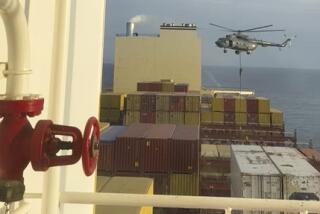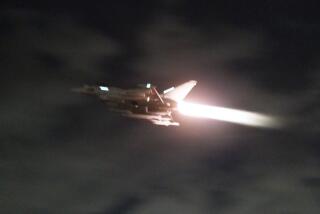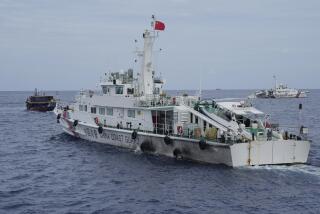Iran naval chief says closing gulf to oil traffic would be easy
Reporting from Tehran and Washington â Iranâs top naval commander said Wednesday that closing the Persian Gulf to oil tanker traffic would be âeasier than drinking a glass of waterâ but that his nation would not do so for now.
âClosing the Strait of Hormuz for Iranâs armed forces is really easy ... or, as Iranians say, it will be easier than drinking a glass of water,â Habibollah Sayyari told the countryâs English language Press TV. âBut right now, we donât need to shut it as we have the Sea of Oman under control, and we can control the transit.â
In Washington, the Pentagonâs chief spokesman, George Little, warned that interference with the passage of vessels through the Strait of Hormuz âwill not be tolerated.... This is not just an important issue for security and stability in the region, but is an economic lifeline for countries in the gulf.â
Mark Toner, a State Department spokesman, sounded a note of skepticism about the threat, saying it was âmore rhetoric from the Iranians.... Iâm saying at this point itâs pure speculation.â
Sayyariâs statement followed by a day a similar threat from Iranian Vice President Mohammad Reza Rahimi to close the gulf to tanker traffic, potentially disrupting the flow of Middle East oil to world markets, if Iran faces any new sanctions. However, there were no immediate signs that their words were a prelude to military action or any more than verbal jousting with Iranâs international critics.
The international community has already imposed some sanctions in response to Iranâs pursuit of a nuclear program, which Tehran says has peaceful goals but which the West fears will lead to the creation of atomic weapons.
INTERACTIVE: The worldâs oil
âWhat does the West expect us to do when we are threatened and attacked?â said Ali Akbar Javanfekr, a media advisor to Iranian President Mahmoud Ahmadinejad. âShould we just throw our hands up and give in? Mr. Rahimiâs reaction was a defensive reaction and we are right to do so.â
Alireza Nader, an Iran specialist at Rand Corp., said the Iranian language was intended to warn the United States and allies against proceeding with the additional harsh economic sanctions they have been preparing.
With their economy already under stress, Iranian officials are worried about the loss of their traditional oil customers and damage to the operations of their central bank. President Obama is expected to soon sign legislation designed to deter foreign companies from buying petroleum through the central bank, even as the European Union weighs an embargo on oil purchases from Tehran.
âIran is raising the ante by saying, âWe donât have the military capability to completely close it, but we can impede traffic,ââ said Nader. Though neither the United States nor Iran wants war, âtensions are so high that thereâs room for miscalculation.â
But Nader Karimi Joni, an Iranian economic and political analyst, was dismissive of the threat. âWhat Rahimi as vice president said is not a big deal or new. First of all, the commander of the Iranian naval force said that Iran does not intend to do it for the time being. Secondly, IRGC [Iranian Revolutionary Guard Corps] commanders on other occasions in the past have said similar things.
âIt is not serious,â Joni said, âand it will not be in the near future.â
Special correspondent Mostaghim reported from Tehran and Times staff writer Richter from Washington.
More to Read
Sign up for Essential California
The most important California stories and recommendations in your inbox every morning.
You may occasionally receive promotional content from the Los Angeles Times.











